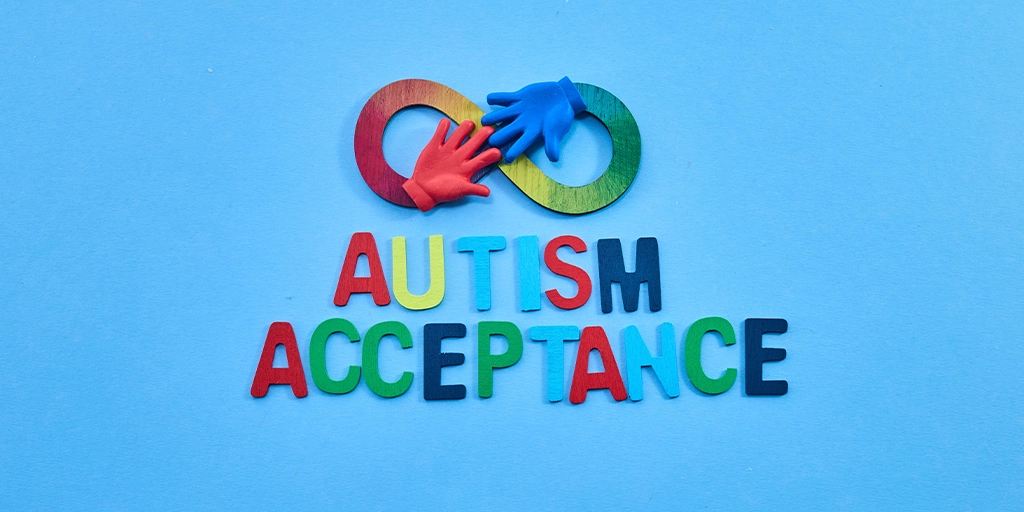Why Autism Acceptance Matters: Moving Beyond Awareness
Updated on January 2, 2025Every year, when April rolls around, the goals of autism advocacy become a hot topic. April 2nd was officially designated by the United Nations as “World Autism Awareness Day” in 2007 (while the entire month was first dedicated for this purpose in the US way back in 1970). These developments brought about the much-needed attention and discussion that autism deserves. But is awareness enough?
Many advocacy groups within the autism community are calling for reform. Instead of using the term “awareness”, they are encouraging and even recommending changing the terminology to “acceptance”. The difference in one small word can have a big impact in terms of how autistic individuals are perceived and treated. No matter where you stand on this issue, there’s a lot that you can do to help support the autistic community next April, and over the year.

Why Autism Acceptance Should Replace Autism Awareness
Awareness is not a bad thing. It’s important to bring awareness to a subject, especially to those who have no understanding at all. Without greater awareness of autism, the individuals and families affected will continue to be misunderstood, misdiagnosed, and misrepresented. However, thanks to campaigns such as World Autism Awareness Day, a light has been shined on autism for millions.
Awareness is the key to protecting children who are non-verbal, unable to understand when something is dangerous, and prone to wandering. Greater awareness helps to educate teachers, therapists, government agencies, communities, and police departments to better support autistic children and families.
But awareness doesn’t equal acceptance, and many in the autism community aim to fix that. In 2011, The Autistic Self Advocacy Network (ASAN) moved away from the word awareness and started defining April as Autism Acceptance Month. Their reasoning behind the shift can be summed up in a single quote:
“Acceptance of autism as a natural condition in the human experience is necessary for real dialogue to occur.”
Many other organizations have also taken the initiative to adopt the new terminology, for example, the Autism Society, the Centers for Disease Control, and the New York State Department of Health. In 2021, the federal government officially changed the designation of the month of April from “Autism Awareness Month” to “Autism Acceptance Month.”

Acceptance is a necessity for those who are integrated into society and seek equality and support within the education system and workplace. Inclusion is a major issue facing those with special needs, as well as accommodations to help people with autism live high-quality, independent lives. A large percentage of the autistic population is under-employed, suffer from depression, and live in poverty. In order to improve the daily lives of those with autism, inclusivity of those on the autism spectrum needs to be more widely encouraged.
Shifting Perspectives: From Awareness to Acceptance
This shift in thinking shows a continued desire for those on the autism spectrum to be fully accepted into society, and so eradicate discrimination. Substituting a few simple words and symbols can have a huge impact that transforms perspectives and encourages change.
A prime example is the autism puzzle piece. For decades, the puzzle piece has been one of the most commonly recognized symbols representing autism. But many see the puzzle piece as infantilizing autism – giving the illusion that it only affects young children while disregarding and excluding autistic adults from the conversation. The puzzle piece also suggests that autism is puzzling or a mystery. Again, an unfavorable connotation, insinuating that something is missing or incomplete. It reinforces the misleading idea that those with autism are incomplete and need fixing.
Replacing the puzzle piece as a symbol of autism and recognizing the inconsistency in its messaging is another shift in thinking happening within the community.
Understanding the Autism Spectrum
As the rate of diagnosis continues to rise, and people are becoming generally more familiar with autism, there is still a long way to go in our understanding of autism. As the name suggests, it’s a spectrum. There are so many unique and beautiful ways that autism presents itself. While higher functioning teens and adults with autism have certain needs they want addressed, there is also a growing number of families with children, young and old, on the other end of the spectrum whose needs are significantly different from the self-advocates.
Autism is also often underdiagnosed, especially in girls and minorities. Without proper diagnosis, thousands of children are not getting the care and support they need. Autistic traits can vary significantly in nature and severity, so a viable one-size-fits-all support solution would be impossible to achieve. In addition, many people with autism are diagnosed with other conditions as well that must be taken into consideration when discussing treatment and therapy plans.

Special Issues to Know About
The starting point of being an advocate is to build your own awareness of the unique hurdles faced by autistic people and their caregivers. We’ve outlined below a brief overview of some of the most common challenges:
Wandering & Safety
Families with children who have autism often face unique safety challenges. Among these are wandering, inability to communicate verbally, and limited awareness of danger. Today, nearly 50% of those with autism will wander, elope or run. This is not just an isolated safety concern. For those who have a child diagnosed with wandering, it is a serious, life-threatening daily challenge. Every parent worries about the safety of their children, but imagine if your child is prone to quickly taking off without notice, is a master of escaping the most secure home or school, and has no real awareness of danger. Learn more about preventing wandering.
Inclusion & Independence
Acceptance is crucial for positive outcomes for children with autism. Inclusion is not only an important part of growing and learning, it is also important for building self-esteem and confidence. Due to safety risks, many children with autism are excluded from activities with their typical peers, for example, not being able to go on field trips. This fosters the feelings of isolation, being different, and lack of worth.
Furthermore, nurturing independence is known to have a significant positive impact on the well-being of children with autism. This can be difficult when considering the serious safety risks involved, but given the right support, it is not only feasible but a necessity for improving long-term independence and access to the community.
Transition & Employment
As children with autism get older, they require different levels of support and face new challenges. Transitions can be difficult for any child but are especially trying for those with developmental and intellectual disabilities. Many of them age out of programs and are left without proper support.
It’s important to address the unique struggles that teens and young adults face when coming of age, desiring more freedom, graduating or aging out of school programs, and entering the workforce.
Government & Legislation
Federal and state legislation is still lacking when it comes to truly supporting this growing population. Many school districts are not fully aware of challenges and safety concerns, denying children the inclusion and measures needed to support and keep them safe.
Join Us During World Autism Awareness Month
We’ve put together some simple ideas for things you can do during World Autism Awareness Month (or anytime) to show your support. Most of these actions take only a few minutes of your time and won’t cost you a dime.
1. Share something
Social media is a powerful place for raising awareness. You can post something as simple as: I love someone with autism. Or, you might want to post something about someone with autism, and how they’re able to overcome the difficulties of their condition.
Where can I find something to share?
If you don’t have a story to share, you can show your support by sharing a fact about autism on Facebook, Instagram, or X. Many autism organizations will have interesting facts and images readily available and shareable on their pages, so be sure to take a look.

2. Offer to help
Juggling household chores and raising a child with autism can be overwhelming. Why not offer to help out for the day? Even something simple like washing dishes or making a meal for the family will be hugely appreciated.
Where can I find a family to help?
There are many organizations that help families with autism. You can contact one near you and offer to volunteer your time. You can also find volunteering opportunities by contacting Autism Speaks and Network for Good.
3. Join an awareness walk
Taking part in an autism awareness walk is a great way to raise awareness and show your support. By walking for autism, you are not only strengthening the voice of the autism community, but you give families who have children with autism hope. There are many autism awareness walks scheduled to take place throughout April (and the course of the year), so you shouldn’t have any trouble finding one in your area.
Where can I find an awareness walk to take part in?
Autism Speaks is a hosting center for autism awareness walks. You can find out about times and locations by clicking here.
4. Get dressed up
Another easy way to show your support is by wearing the autism awareness puzzle ribbon. This is the most commonly recognized symbol of the autism community. There are many ways you can display the ribbon, so get creative. You can pin it to your shirt, put a sticker on your car, add a ribbon badge to your blog or even change your Facebook profile picture.
Where can I find an autism awareness ribbon?
It’s easy and fun to make your own, especially if you have kids. This is a great opportunity to teach your kids more about autism. You can also order your ribbon online. There are many online stores, like Amazon, which stock autism awareness products including ribbons.
5. Learn about it
The more people know about autism, the easier it will be to confront the many stereotypes and misconceptions about the disorder. And it starts with you! By learning more about the condition, you’ll be in a better position to teach friends, family members, and other people who don’t know much about autism.
Where can I find out more about autism?
There are tons of very useful online resources to help you better understand autism. You can start by having a look at the National Autism Association. Other helpful resources include Autism Daddy, Friendship Circle, and the National Autistic Society.
6. Speak up
Autism is one of the most commonly misunderstood conditions around, and people tend to say hurtful things about people with autism. You can raise awareness by listening for these types of comments, and speaking up when you do hear them. By showing support and encouraging people to challenge their assumptions, you’re helping to change the way people perceive autism.
How do you plan on showing your support during World Autism Awareness Month? Share your tips and suggestions in the comments below.
AngelSense is committed to creating a safer world for special needs children. Our cutting-edge GPS tracking and monitoring solution was designed to give parents the peace of mind that their children are safe at all times. You deserve peace of mind too. Join AngelSense Today.
Get peace of mind from AngelSense, the groundbreaking AI-based assistive technology designed to enhance safety and peace of mind for individuals with special needs and their families. Our solution ensures you stay connected with your loved ones, empowering a higher level of independence while maintaining safety. Learn more about how AngelSense can make a difference for your family.

